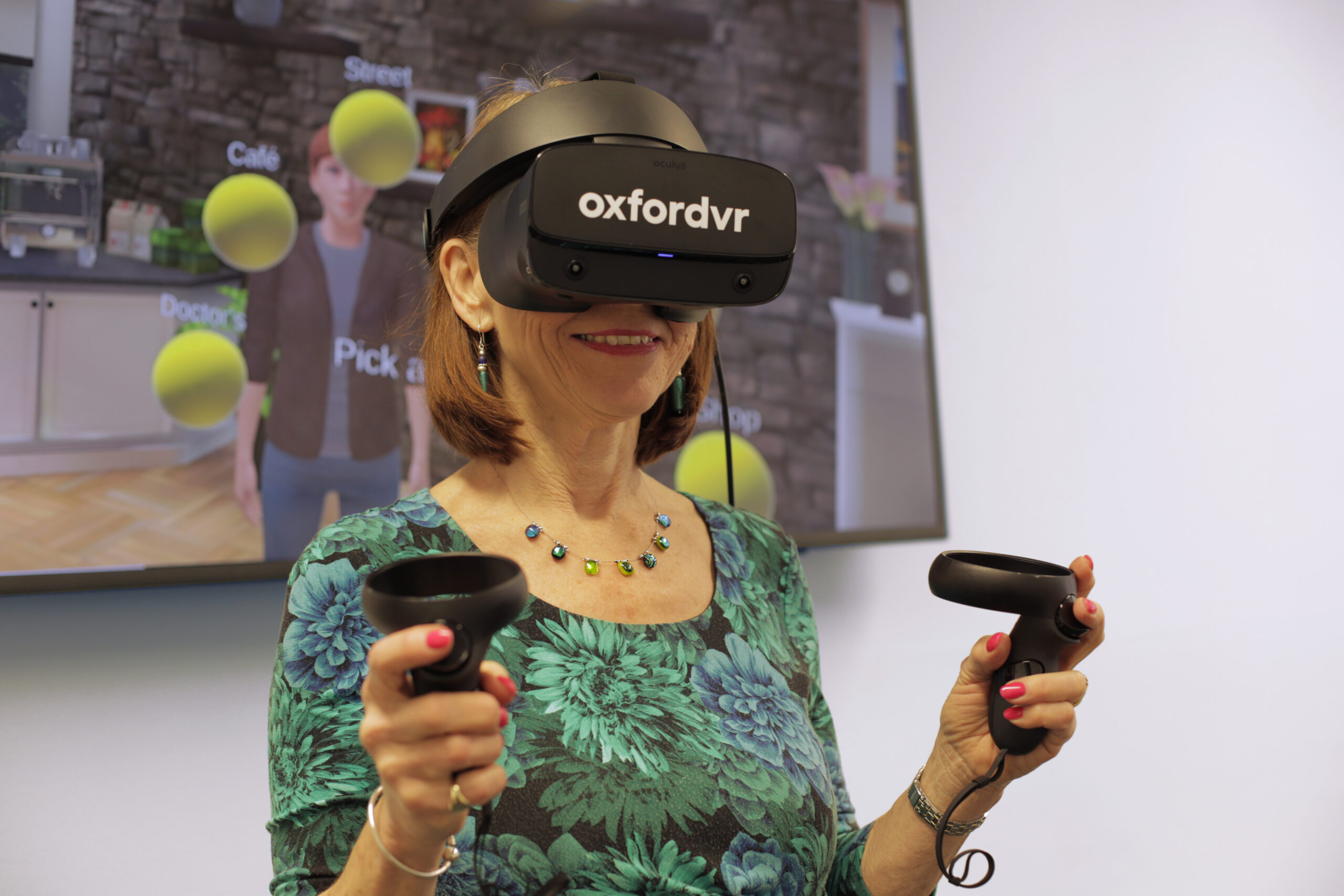

A UK startup has secured breakthrough device designation for a prescription-based software product using virtual reality to treat people with serious mental illness.
The designation from the U.S. Food and Drug Administration should help speed adoption of the therapy, developed by Oxford VR, according to Deepak Gopalakrishna, the company’s CEO and co-founder.
He credited the designation, in part, to a recent clinical trial that demonstrated the efficacy of the therapy, called gameChange. Published in April in The Lancet Psychiatry, the trial results showed that gameChange made a difference over six weeks of treatment for people who previously had been too anxious to visit a store, ride a bus or even leave home.
The product brings other potential benefits, as well, Gopalakrishna said. It can lower costs and broaden access for a relatively expensive subset of patients suffering from severe mental illness, Gopalakrishna said in an interview. They make up about 5.6% of the U.S. population, according to data from the National Mental Health Institute.
“There’s just not enough well-trained therapists to be able to meet the demands of the people who need that care,” he said.
Other digital health startups are working to address the shortage of mental health professionals and find new ways to deliver care. They include BetterHelp, Limbix Health, Octave and Spring Health. The latter recently published research showing its workplace-based program, which uses machine learning to customize care, has saved money for employers.
For its trial, Oxford VR studied gameChange’s impact on 346 patients. Roughly half used the VR product in conjunction with their usual care, while the other half received only their usual care. The most severe patients saw a 49% reduction in avoidance behaviors, a 41% reduction in paranoia and a 21% increase in quality of life after six weeks of care.
The study’s authors include Daniel Freeman, a psychology professor at Oxford University and co-founder of Oxford VR. His research underpins the gameChange software.
The research on gameChange appears promising, said John Torous, director of digital psychiatry at Beth Israel Deaconess Medical Center in Boston, which is affiliated with Harvard Medical School. The challenge for digital mental health in general has been scaling up from small studies to widespread implementation, he said.
Providers may struggle to fit new technology into existing workflows or lack the skills needed to make it work, he said in a phone interview.
“Do you need a VR expert on staff to help people use it or can existing staff manage it?” he asked to point out a question that providers may have with respect to adopting the technology.
When it comes to Oxford VR, that would be a no. Gopalakrishna said that Oxford VR has sought to make gameChange as simple as possible for both patients and the providers who oversee its use. So no VR-trained expert is needed nor do users need any extra technical training.
The company does offer training and tech support to clinic staff to get them started, he said. The training includes how to assist patients in translating their VR experience into the real world.
“For us, it’s literally drag-and-drop easy,” Gopalakrishna said.
In a traditional approach to cognitive behavioral therapy, a therapist might take a patient out into the world, Gopalakrisha said. If and when they encounter a situation that triggers anxiety, the therapist provides guidance to lessen the effect.
“That leaves a lot to chance,” Gopalakrishna said. It also is costly, as a therapist may spend months with an individual patient.
Instead, gameChange recreates the stressful situations in virtual reality and guides patients, with the help of an automated therapist. Even though patients are in virtual reality, they perceive the situations as real, Gopalakrishna said. The software can run on any commercially available VR headset.
The goal is not to replace therapists but to expand their capacity to treat patients, Gopalakrishna said. Instead of seeing a therapist every week, for example, patients could alternate weekly between the therapist and gameChange, potentially doubling the capacity of the therapist.
Backed by the trial results and FDA clearance, Oxford VR has been rolling out gameChange at clinics operated by the National Health Service and at providers in the U.S. Gopalakrishna declined to identify them.
In the UK, Oxford VR is paid out of any cost savings that arise from the use of gameChange, Gopalakrishna said. The company operates under a range of payment models in the U.S. but it expects to be reimbursed primarily out of bundled payments paid to providers for taking care of patients.
Most patients use gameChange in a clinical setting. However, the product is available for home use under a program with the Wounded Warrior Project, a nonprofit that focuses on U.S. veterans suffering physical injuries or mental illness.
Founded in 2017, Oxford VR raised $12.5 million in a Series A round in February 2020. Investors included Optum Ventures, Luminous Ventures, Oxford Sciences Innovation, Oxford University Innovation and GT Healthcare Capital Partners.
The company also offers a VR product designed to help patients overcome anxious social avoidance.


















